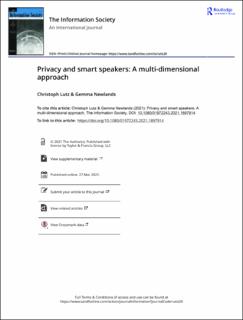Privacy and smart speakers: A multi-dimensional approach
Journal article, Peer reviewed
Published version
Permanent lenke
https://hdl.handle.net/11250/2754878Utgivelsesdato
2021Metadata
Vis full innførselSamlinger
- Scientific articles [2181]
Sammendrag
Over the last few years, smart speakers such as Amazon Echo and Google Home have become increasingly present within British households. Yet, privacy remains a prominent concern in the public discourse about smart speakers, as well as in the nascent academic literature. We argue that privacy in the context of smart speakers is more complex than in other settings due to smart speakers’ specific technological affordances and also the axial relationships between users, the device, device manufacturers, application developers, and other third parties such as moderation contractors and data brokers. With survey data from Amazon Echo and Google Home users in the UK, we explore users’ privacy concerns and privacy protection behaviors related to smart speakers. We rely on a contextual understanding of privacy, assessing the prevalence of seven distinct privacy concern types as well as three privacy protection behaviors. The results indicate that concerns about third parties, such as contractors listening to smart speaker recordings, are most pronounced. Privacy protection behaviors are uncommon but partly affected by privacy concerns and motives such as social presence and utilitarian benefits. Taken together, our research paints a picture of privacy pragmatism or privacy cynicism among smart speaker users.

